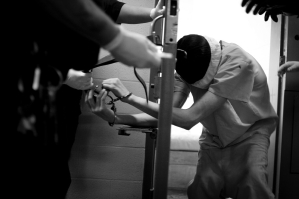
In the wee hours of March 17, 2013, Christopher Lopez, who suffered from bipolar disorder, lay face down on the floor of his cell, semi-conscious and barely able to move.
Instead of being brought to the clinic, Colorado prison staff handcuffed him, shackled his ankles and placed him in a restraint chair. A couple of hours later, guards brought the prisoner to another cell, still in chains.
Lopez died around 9:00 a.m. the same day. Autopsy revealed that he suffered from hyponatremia, a blood disorder that was treatable had the patient received immediate medical attention.
Lopez' case is one of many instances that show how jail and prison staff across the U.S. used "unnecessary, excessive, and even malicious force" against prisoners suffering from mental disorders, according to the Human Rights Watch (HRW).
The HRW released a 127-page report, "Callous and Cruel: Use of Force against Inmates with Mental Disabilities in US Jails and Prisons," that details incidents in which correctional staff attempted to restrain prisoners using different kinds of violent measures.
It said U.S. jails and prisons appeared not to be equipped to handle persons suffering from mental health issues.
"Jails and prisons can be dangerous, damaging, and even deadly places for men and women with mental health problems," said Jamie Fellner, U.S. program senior adviser at Human Rights Watch and the author of the report. "Force is used against prisoners even when, because of their illness, they cannot understand or comply with staff orders."
HRW's study believes that incidents involving inmates with mental issues are rising in the more than 5,100 jails and prisons across the U.S. The lack of staff training, poor leadership, and clear-cut use-of-force policy, among other factors, are being blamed in the rise of such incidents.
The study, published earlier this week, discovered that prison staff responded with violence when inmates display behavior that reflects the state of their mental health. Regardless of whether the behavior was non-threatening, like urinating on the floor, cussing, or banging on a cell door, guards still punish inmates with force, according to the report.
The report gathered hundreds of cases and justice department investigations in coming up with a comprehensive data on the state of inmates suffering from mental disabilities. It also interviewed over 125 current and former corrections officials, use of force experts, psychiatrists, and prison reform advocates to shed light into the issue.
While national data is unavailable, an estimated one in five inmates in the U.S. suffer from a serious mental illness, and about five percent are actively psychotic. Mental disorders include schizophrenia, bipolar disorder, and major depression.
As such, prisoners suffering from such conditions could not easily cope with the stress of incarceration, particularly complying with prison rules and regimen. The study pointed out that given their status, prisoners could display behavior that prison guards might find annoying or disruptive, leading them to respond with force.
For instance, Marie Franks, who suffered from bipolar disorder, was jailed in Iowa in 2013 for making multiple non-emergency calls to 911. Her mental condition worsened in jail as she did not receive her medication.
On October 7, she refused to change her jumpsuit and cursed at the jail staff. The jail guard shocked her with a Taser multiple times in eight minutes.
"Custody staff are not trained in how to work with prisoners with mental disabilities, how to defuse volatile situations, or how to talk prisoners into complying with orders," Fellner said. "All too often, force is what staff members know and what they use. In badly run facilities officers control inmates, including those with mental illness, through punitive violence."







